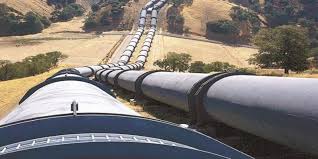Experts from ECOWAS, the Moroccan National Hydrocarbons and Mining Office (ONHYM), the Nigerian National Petroleum Corporation Limited (NNPCL) and the representatives of the countries involved in the Nigeria-Morocco gas pipeline project are meeting in Abidjan, Cote d’Ivoire to discuss the legal, technical and environmental challenges facing the gas pipeline project.
The workshop, organized by the ECOWAS Commission in collaboration with the Moroccan National Hydrocarbons and Mining Office (ONHYM) and the NNPC, in Abidjan marks an important step towards finalising key agreements for the Nigeria-Morocco Gas Pipeline project.
The four-day workshop, which opened on August 27 is aimed at finalising the Intergovernmental Agreement (IGA) and Host Government Agreement (HGA) for this major energy infrastructure.
The gas pipeline, which crosses several countries, poses significant
legal, technical and environmental challenges. The countries involved
are addressing issues such as energy security, risk and benefit sharing, and long-term investment protection.
The IGA, as a cross-border treaty, is at the heart of the discussions. It sets out the rules for the operation, management and governance of the pipeline. At the same time, the HGA will specify the specific terms and conditions between the project company and each host state, ensuring harmonious management of the infrastructure on the national territories involved.
These discussions, which followed several rounds of negotiations in Rabat and Marrakech, demonstrated the commitment of the countries involved. The presence of the delegations, together with experts from ONHYM and the NNPCL, underscores their collective determination to advance this project with continental ambitions.
Beyond the obvious economic benefits, the Nigeria-Morocco gas pipeline is part of a strategic approach to South-South cooperation. It is in line with the King of Morocco’s vision of giving Africa a new economic, political and strategic dimension.
The project aims to promote the continent’s energy interconnection and give new impetus to inter-African economic exchanges.
The finalization of the Abidjan agreements will be followed by several phases of technical and administrative implementation. The expected economic benefits include not only improved access to energy for the
countries served, but also significant job creation and closer integration of regional markets.
The Nigeria-Morocco gas pipeline, by virtue of its scale, can become a central pillar of Africa’s energy strategy, reducing dependence on energy imports and stimulating long-term economic growth.
The workshop in Abidjan is therefore an important milestone in the implementation of this project and once again symbolizes the potential of Africa as it embarks on the path of cooperation and economic integration.
The progress made in these discussions will be crucial for the continent’s energy future and its ability to face tomorrow’s global challenges together.
MN/te/lb/GIK/APA


